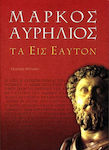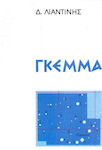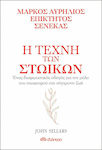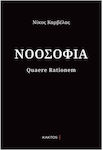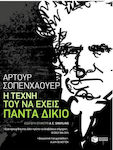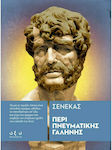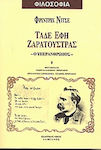Skroutz Buyers Protection
Κίνησις, βίος, καιρός, τέχνη, πόλις, Φαινομενολογικές προσεγγίσεις: Martin Heidegger, Hannah Arendt, Jan Patocka, Michel HenryCode: 13707333
- Author: Γκόλφω Μαγγίνη
- Publisher: Patakis
- Μορφή: Soft Cover
- Έτος έκδοσης: 2017
- Αριθμός σελίδων: 526
- Κωδικός ISBN-13: 9789601672403
- Διαστάσεις: 24×17
Γκόλφω Μαγγίνη

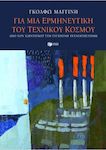
Philosophy Books
Για μια ερμηνευτική του τεχνικού κόσμου, Από τον Χάιντεγκερ στη σύγχρονη τεχνοεπιστήμη
from 19,45 €Added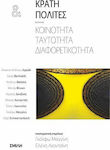
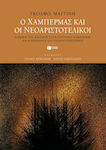

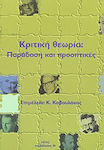
Similar products
All shops
Prices are calculated for:Luxembourg, Other Payment Options
- 18,75 €
- 17,50 €
- 17,50 €
- 22,25 €
- 25,00 €
- 18,75 €
- 17,50 €
Description
In the present study, the crucial issue of how contemporary phenomenology, through four major representatives, refers to ancient Greek philosophy does not follow the logic of linear development of philosophical positions, to the extent that it promotes direct engagement with Greek conceptualization in the fields of ontology, ethics, and politics.
But why do concepts serve as bridges between philosophical thought and both Greek heritage and contemporary phenomenological philosophy in its various forms? The exercise of the phenomenological method opens up here in the interpretive confrontation with the other, that which is temporally distant, as well as linguistically and conceptually different, "the Greek." The choice of five primary ancient Greek concepts serves the interpretive mandate of lectiodifficilior, for which phenomenological philosophy, in its plurality, signifies a unified mode of inquiry. A necessary precondition for this endeavor is the recognition of the coexistence of two opposing interpretive gestures, one of appropriation and simultaneously one of disappropriation, regarding the way in which contemporary phenomenology, in all its forms, signifies "the Greek."
In reality, "thinking in Greek" is a challenge for the phenomenological method, both in terms of how it is practiced and in terms of the limits of its stakes. What is certain is that the renewed access to classical thought constitutes the cutting edge of its relevance for the four phenomenologists addressed in this study: the five ancient Greek concepts are neither self-evident nor timely nor untimely, as it is the exercise of the phenomenological gaze that renders them interpretively active.
Specifications
- Subtitle
- Phenomenological approaches: Martin Heidegger, Hannah Arendt, Jan Patocka, Michel Henry
- Format
- Soft Cover
- Number of Pages
- 526
- Publication Date
- 2017
- Dimensions
- 24x17 cm
Important information
Specifications are collected from official manufacturer websites. Please verify the specifications before proceeding with your final purchase. If you notice any problem you can report it here.


































